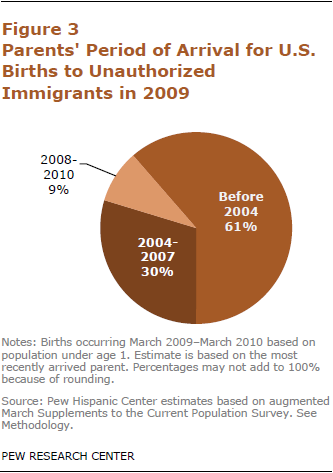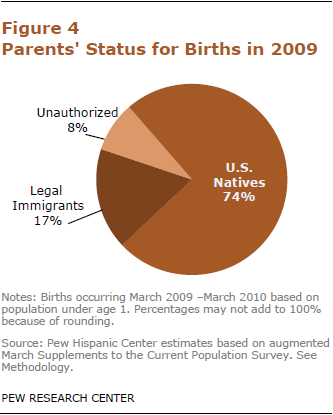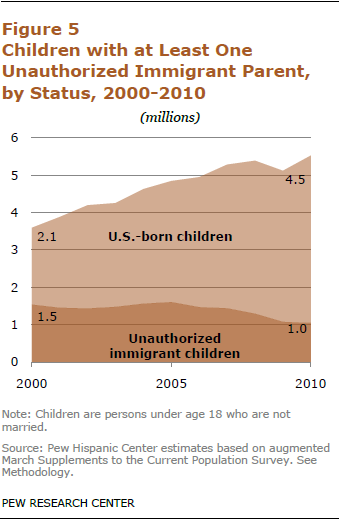 Among births from March 2009 to March 2010, 350,000 newborns had at least one unauthorized parent, a number that statistically is no different from the estimate of 340,000 published by the Pew Hispanic Center for 2008-2009.
Among births from March 2009 to March 2010, 350,000 newborns had at least one unauthorized parent, a number that statistically is no different from the estimate of 340,000 published by the Pew Hispanic Center for 2008-2009.
These newborns represented 8% of all births during this period, the same share as for the previous year. Unauthorized immigrants represent about 4% of the U.S. population but are relatively young and have high birthrates, which is why their newborns make up a higher share of all births.
 Among all births in the U.S. in 2009-2010, 74% were to U.S.-born parents and 17% to legal immigrants.
Among all births in the U.S. in 2009-2010, 74% were to U.S.-born parents and 17% to legal immigrants.
The Pew Hispanic Center analysis also examined year-of-arrival patterns for unauthorized immigrant parents of babies born from March 2009 to March 2010, to see how long the parents had been in the United States before their children were born. If year of arrival was available for both parents, the analysis used the most recently arrived parent.
According to the analysis, 9% of these unauthorized immigrants who had babies in 2009-2010 had arrived in the U.S. in 2008 or later. An additional 30% arrived from 2004 to 2007, and the remaining 61% arrived in the United States before 2004.
 As with previous analyses, the Pew Hispanic Center finds that among all children of unauthorized immigrants—an estimated 5.5 million in 2010—a growing share was born in the United States and therefore they are U.S. citizens by birthright.
As with previous analyses, the Pew Hispanic Center finds that among all children of unauthorized immigrants—an estimated 5.5 million in 2010—a growing share was born in the United States and therefore they are U.S. citizens by birthright.
Among children of unauthorized immigrants, an estimated 4.5 million are U.S.-born; 1 million are foreign-born and therefore unauthorized. The number of unauthorized children has declined from a peak of 1.6 million in 2005. The number of U.S.-born children has more than doubled from 2.1 million in 2000.1
The 14th Amendment to the U.S. Constitution, adopted in 1868, grants an automatic right to citizenship to anyone born in the United States. In recent months, some prominent national and state elected officials have urged that this right be repealed at the national or state level, on the grounds that it attracts unauthorized immigrants to the United States. A nationwide survey by the Pew Research Center in October found that registered voters are split (46% to 46%) about whether to amend the Constitution to end birthright citizenship. A majority of Republican respondents (67%) favor amending the Constitution, compared with about half of independents (48%) and a minority of Democrats (30%).
Mexico is more dominant as a country of origin among unauthorized-immigrant parents than it is among all unauthorized immigrants. Among children with at least one unauthorized immigrant parent, 70% have parents from Mexico, 17% from other Latin American countries, 7% from Asia, 2% from Europe and Canada, and 3% from Africa and other nations.


